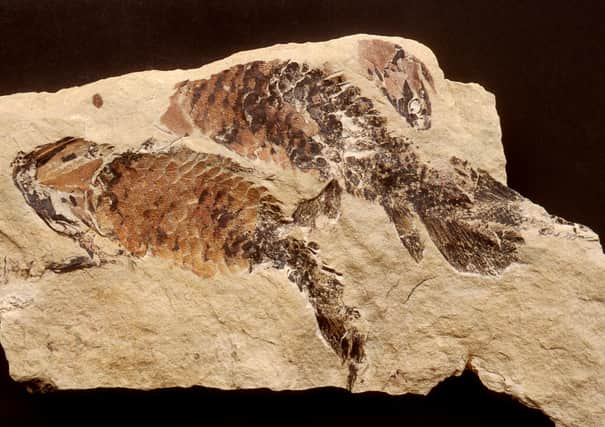Scotland's 250,000 fossils that hold the key to life on earth brought together for first time


The fossils which are kept in museums up and down the country have been collated in a far-reaching review which is hoped will better open up the scattered collection to researchers and the public at large.
It has taken three years to collate the information on the fossils held by 58 museums as part of the James Ellerman Project.
Advertisement
Hide AdAdvertisement
Hide AdThe 410 million-year-old Rhynie Chert of Aberdeenshire, which holds the earliest known terrestrial ecosystem on Earth
and includes preserved plant, fungus, lichen and animal material, is among the fossils now listed.
It was formed when ancient hot springs spouted mineralised water that then coated plants and animals that lived on the ground and in pools. The deposits then turned into hard rock – or chert – which then uniquely preserved the creatures and fauna.
Fossil fish from the Middle Devonian of Caithness, Sutherland, Orkney, Shetland and the Moray Firth are included.
Some are from the Achanarras Quarry in Caithness, an area which was covered by a huge lake 385 million years ago, when Scotland lay south of the equator and the Highlands were bigger than the Alps.
When fish died here they were buried in layers of silt, and eventually fossilised. Now famous all over the world for its well-preserved fish of the Middle Devonian period, many new species have been discovered at the quarry.
The review has brought together extensive collections of fossils found in Nairn Museum, Elgin Museum, Inverness Museum and Art Gallery, Stromness Museum, The Discovery Centre and Glasgow Museums Resource Centre.
Dr Sue Beardmore, curator of the John Ellerman Project at National Museums Scotland, said: “It has been really fascinating to review the hugely varied fossil collections held around Scotland. Some of the material featured is well known to national and local audiences, much of it less so.
Advertisement
Hide AdAdvertisement
Hide Ad"We hope that this review helps to raise the public profile of these collections, will be of use to researchers and scholars and will help museums to further develop and care for these collections now and in the future.”
Dr Nick Fraser, Keeper of Natural Sciences, National Museums Scotland said the review was an “important and substantial” piece of work that would unlock the story of fossils for many.
Dr Fraser added: “One striking thing is the way in which these diverse collections frequently mirror the immediately local geology and, considered together, show how important Scotland’s geological and fossil record is in understanding the development of life on earth.
"On a more practical level, it’s also really useful. Expert assessments like this review set museums up to be able to start sorting and properly documenting the nation’s natural science assets. This benefits the museum sector generally and each of the individual museums as it gives those that need it the power to unlock these collections to make them more accessible for people, whether scientific researchers or the wider museum-visiting public.”
A message from the Editor:
Thank you for reading this article. We're more reliant on your support than ever as the shift in consumer habits brought about by Coronavirus impacts our advertisers.
If you haven't already, please consider supporting our trusted, fact-checked journalism by taking out a digital subscription.
Comments
Want to join the conversation? Please or to comment on this article.
